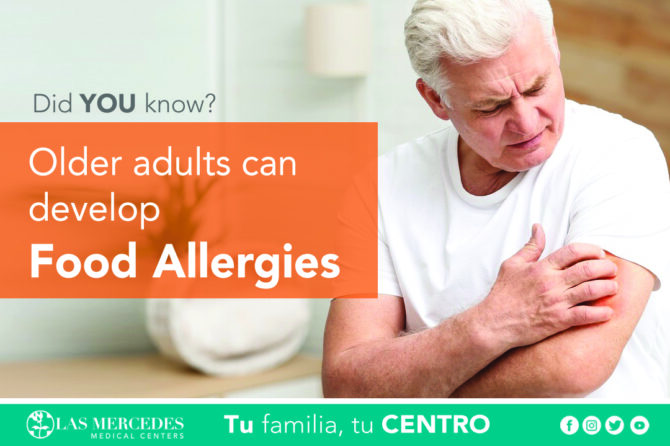
Can Older Adults Develop Food Allergies?
Most food allergies start in childhood, but that doesn’t mean you’re in the clear. Protect yourself by staying proactive and informed.
Food allergies are a big topic among children and their parents, but they’re something that should be on your radar too.
Today, nearly 15 million Americans have at least one food allergy. And according to recent research from Northwestern University Feinberg School of Medicine, about half of adults with food allergies first experienced them after the age of 18.
“You can develop a food allergy at any age,” says Flavia Hoyte, M.D., an allergist and immunologist at National Jewish Health in Denver. In other words, you may have eaten a food your whole life with no problems and then suddenly develop an allergy to it.
Scientists aren’t exactly sure why this happens, and research on food allergies in adults is a fairly new area. But one factor for older adults: As we age, so does our immune system (it’s called “immunosenescence”). This causes cells to start reacting differently to certain stimuli, including foods.
What Causes Food Allergies?
Allergies are the result of a reaction that starts in your immune system, according to the American Academy of Allergy, Asthma, and Immunology (AAAAI).
If you have an allergy to a certain food, your immune system mistakenly identifies a protein in that food as an invader and sends antibodies to kill it. It can cause symptoms like:
- Itching
- Hives
- Swelling
- Diarrhea
- Anaphylaxis, a potentially life-threatening reaction characterized by wheezing, throat or chest tightness, or trouble breathing
According to AAAAI, 90 percent of food allergies are caused by these allergens:
- Shellfish: More common in adults
- Fish: More common in adults
- Peanuts: More common in adults
- Tree nuts: More common in adults
- Cow’s milk
- Eggs
- Soy
- Wheat
Most food allergy symptoms happen within two hours after eating, says Dr. Hoyte. You should know pretty quickly if your body isn’t reacting well to something you’ve eaten.
You don’t need to have a major reaction to be considered allergic. If you notice something as minor as an itchy throat or intestinal discomfort after consuming any of the foods above, tell your doctor. If you experience any signs of anaphylaxis, seek medical help right away, or take emergency medication (more on that below).
How to Determine If You Have a Food Allergy
The only way to confirm a food allergy is via medical testing, such as:
- Skin prick tests
- Blood analysis
- Oral food challenge, where your doctor will feed you small doses of a food and observe how your body reacts
Do not try to self-diagnose. This can be dangerous since you don’t know how you’ll react. Plus, other conditions can mimic the symptoms of a food allergy.
If your doctor confirms that you have an allergy, you’ll need to avoid that food as much as possible. Your allergist will also likely prescribe an epinephrine auto-injector like an EpiPen to keep with you. If you ever have a severe allergic reaction, the EpiPen can deliver a shot of epinephrine to open your airways and reverse other effects.
Also essential: Make sure your loved ones are aware of your allergy and know where to find your auto-injector.
“Never leave home without it,” says Dr. Hoyte. “It can’t help you there.”
From: SilverSneakers.com
Leave a reply


Thanks for helping me understand that the symptoms of food allergy would usually show after two hours of eating. In that case, I need to look for allergy testing services to check what caused the rashes I had this evening. We went to a party and ate various types of meals, so I really don’t know what to pinpoint for now.
ReplyThank you for citing the American Academy of Allergy, Asthma, and Immunology’s statement that allergies are the outcome of an immune system reaction. If the environment is too dusty, my sister reacts. I’ll advise her to get a skin allergy test.
Replythanks for info
ReplyThanks for helping me understand that allergies would be caused by the reaction of the immune system to certain things according to the AAAAI. I think I have developed one for seafood now that I am turning 30, because of my obsession with them. And I will get an allergy testing service to confirm it, but I hope it is not the case because I really love shrimps and crabs.
Reply